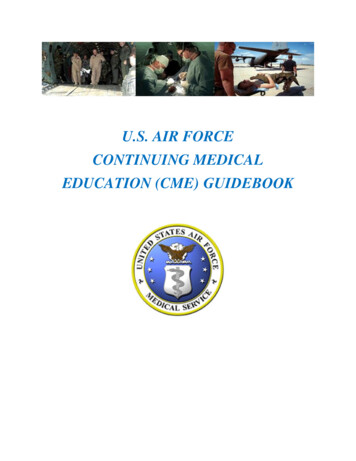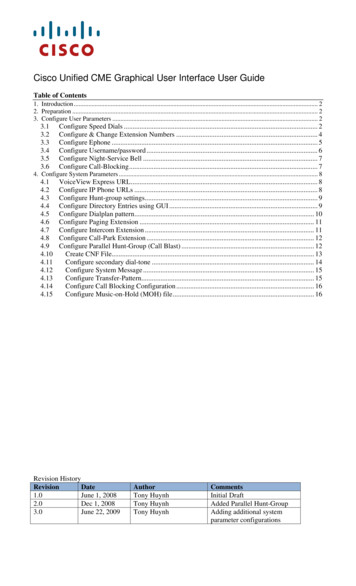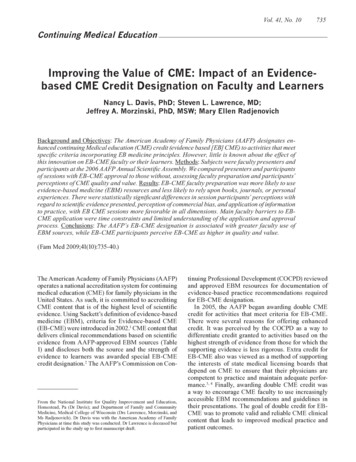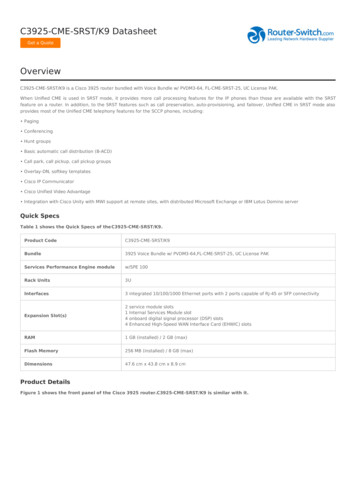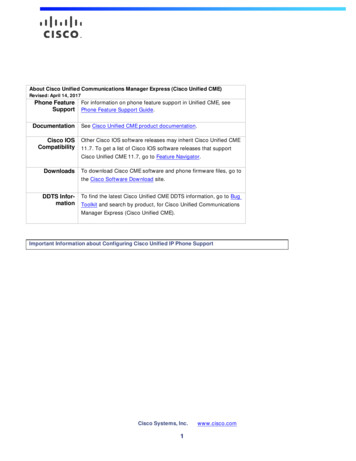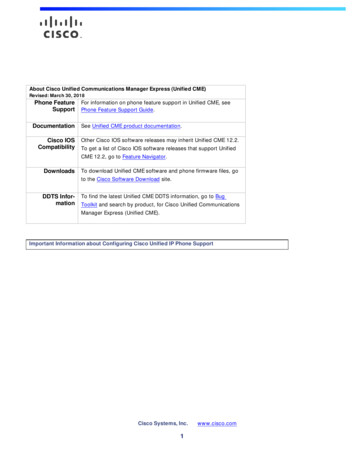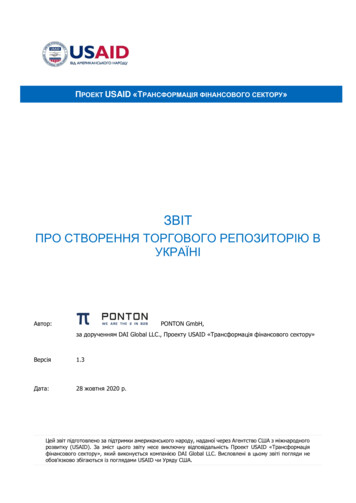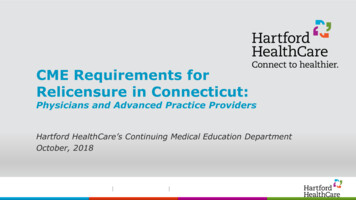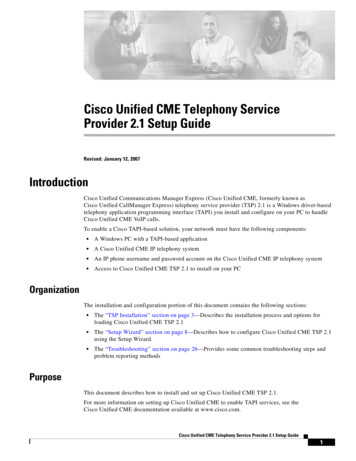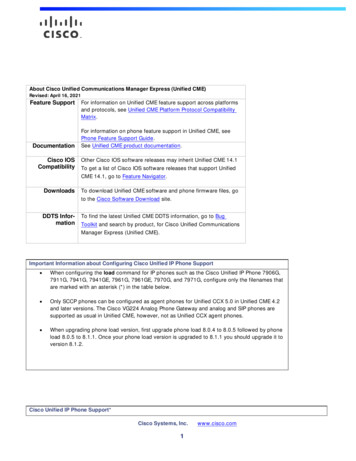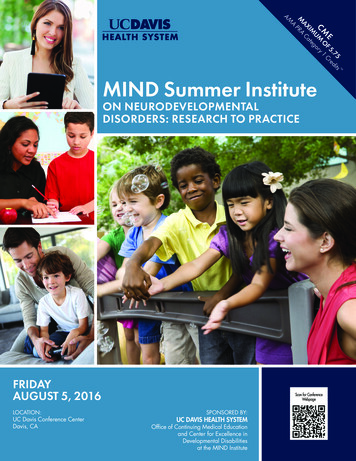
Transcription
A5 ts.7 diE F 5 CreO 1CMUM orygIM ateAX CM PRAAM MIND Summer InstituteON NEURODEVELOPMENTALDISORDERS: RESEARCH TO PRACTICEFRIDAYAUGUST 5, 2016LOCATION:UC Davis Conference CenterDavis, CAScan for ConferenceWebpageSPONSORED BY:UC DAVIS HEALTH SYSTEMOffice of Continuing Medical Educationand Center for Excellence inDevelopmental Disabilitiesat the MIND Institute
MIND SUMMER INSTITUTE ON NEURODEVELOPMENTAL DISORDERSFRIDAY, AUGUST 5, 20167:30 – 8:30 amRegistration, Continental Breakfast, Visit Resource Table and AT Demonstrations8:30 – 8:45Welcome, Review of Objectives8:45 – 10:00Keynote Address: The Future of Disability Policy: A National PerspectiveIn this keynote presentation, you will hear from the Executive Director of the Association of University Centers on DevelopmentalDisabilities and Senator Tom Harkin’s former disability policy director about a new federal agenda that will leverage bipartisaninterest in improving education and employment outcomes, enhancing self-determination and choice, and building inclusivecommunities for the more than 57 million Americans with disabilities.Andrew J. Imparato, JD10:00 – 10:30Break, Move Into Workshops10:30 am – 12:00 pmEARLY INTERVENTION1Research Update: Early Indicators of2Autism Spectrum DisordersDr. Sally Ozonoff will update participants onthe most recent findings from research takingplace at the UC Davis MIND Institute related toearly indicators of Autism Spectrum Disorders.Sally Ozonoff, PhD1:00 – 2:30 pm12:00 - 1:00 pmTRANSITION/ADULTCalifornia Special Education Task Force –3Phase 2 ImplementationThis panel will provide an update on theimpact of the recommendations from theCalifornia Statewide Special Education TaskForce Report. Upon its release and roll-outto the many bodies possibly effected bythe reform, a constant question asked was,“What’s next?” A phase two of implementationwas recommended to include interagencycollaboration and reform, developmentof professional learning opportunities,dissemination of evidence-based practices,early learning enhancements, addressingdisproportionality and educator preparation,and multiple funding reforms. This presentationwill provide updates on the recommendations.Maureen O’Leary Burness, MS, Teri Clark,Kristin WrightSupported Decision Making,an Alternative to ConservatorshipsThis panel will discuss supported decisionmaking as an alternative to conservatorshipfor adults with intellectual and developmentaldisabilities. Panelists will discuss how supporteddecision-making can be implemented inmedical and other decision-making contexts,and how it can help people with disabilitiesnot only develop the tools to make their owninformed choices, but also to live safer andfuller lives.Lynne O’Hara, Susan Mizner, JD, Clarissa Kripke, MD,Zoë Brennan-Krohn, JD, Katie Hornberger, JD,Lisa CooleyLUNCH (included in tuition) Visit Resource Table and AT Demonstrations4 Using the Desired Results DevelopmentalProfile (2015) With Young Children WithNeurodevelopmental Disabilities to InformEmbedded Instruction PracticesThis workshop will describe how to linkresults of the statewide assessment for earlylearning (the DRDP 2015) to the CaliforniaEarly Learning Foundations and EmbeddedInstruction for children with individualizededucation programs (IEPs). Resources tosupport the DRDP (2015) and the EmbeddedInstruction for Early Learning model willbe provided.Patricia Snyder, PhD, Mary McLean, PhD,Patricia Salcedo, MA2:30 - 2:45 pm2:45 – 4:15 pmSCHOOL AGED6Home and Community Based Services (HCBS)The federal Centers for Medicare & MedicaidServices (CMS) announced new rules thatwill fundamentally transform residentialand day services funded through Medicaidas part of Home and Community BasedServices (HCBS). Members of this panel willdiscuss opportunities and challenges as wellas the impacts of these changes taking placein California.Jim Knight, Janis White, EdD, Sarah Murphy, MA, Ed8 Development and Testing of an Individualized 9Mental Health Intervention for ASDHelping Young Adults With ASD to AchieveTheir Life Goals: Preliminary Results From theACCESS Program (Acquiring Career, Coping,Executive-Function and Social Skills)Presenters will describe the three majorcomponents of the curriculum – usingcognitive behavioral therapy (CBT)methods to enhance coping and reducestress, scaffolding the development oforganizational skills, and promotingenhanced social functioning. They will alsoshare the preliminary results of the initialtrial of this innovative program.Marjorie Solomon, PhD, MBA, Tasha M. Oswald, PhD5 Social Context’s Role in Disability Identificationand Special Education Placement DecisionsWhile many of us think of disability as anintrinsic personal trait, children’s odds ofactually being identified with a learning, speech,or emotional disorder are strongly shaped bythe people and resources with which they aresurrounded. This presentation explores theimplications of these “contextual effects” forpatterns of disproportionality and inequality inspecial education service provision.Jacob Hibel, PhDBREAK7 Early Intervention Policy PanelThis panel will include presentations fromthe CA Departments of Health, DevelopmentalServices, and Education on the following topics: Overview of the federal Maternal, Infantand Early Childhood Home Visiting(MIECHV) Program Upcoming changes in the state and federalaccountability systems for IDEA Early Start State Systemic ImprovementPlan (SSIP)Kristen Rogers, PhD, Sharon DeRego, LCSW,Jennifer Teykaerts, Elise Parnes RN, BSN, MSN,Theresa Costa Johansen, EdD4:15 pm ADJOURNDr. Brookman-Frazee will provide an overviewof her research on mental health services forchildren with ASD. She will discuss commonco-occurring mental health problems seen in thispopulation and describe the development andtesting of an individualized ASD interventiondesigned for delivery in mental health services.Lauren Brookman-Frazee, PhD
FACULTYCOURSE CHAIRPLANNING COMMITTEERobin L. Hansen, MDProfessor of PediatricsDirector, Center for Excellence in Developmental DisabilitiesDirector of Clinical Programs, MIND InstituteUC Davis Health SystemGUEST FACULTYZoë Brennan-Krohn, JDFord FellowACLU Disability Rights ProgramLauren Brookman-Frazee, PhDAssociate ProfessorUC San Diego Department of PsychiatryResearch and Training DirectorAutism Discovery Institute at Rady Children’s HospitalTeri ClarkDirectorProfessional Services DivisionCommission on Teacher CredentialingLisa CooleySelf-AdvocateTheresa Costa Johansen, EdDDirector, Office of Client Rights AdvocacySpecial Education DivisionCalifornia Department of EducationSharon DeRego, LCSWCalifornia Part C Coordinator/ManagerMonitoring and Family Services BranchDepartment of Developmental ServicesJoshua HoriAccessible Technology AnalystCenter for Accessible TechnologiesUC Davis Health SystemKatie Hornberger, JDDisability Rights CAAndrew J. Imparato, JDExecutive DirectorAssociation of University Centers on DisabilitiesWashington DCJim KnightAssistant Deputy DirectorCommunity Services DivisionCalifornia Department of Developmental DisabilitiesClarissa Kripke, MDProfessor of Family and Community MedicineUniversity of California San FranciscoMary McLean, PhDProfessorSchool of Special Education, School Psychology& Early Childhood StudiesAnita Zucker Center for Excellence inEarly Childhood StudiesUniversity of FloridaSusan Mizner, JDDisability CounselACLU Disability Rights ProgramSarah Murphy, MA, EdProviderTransCen, Inc.Lynne O’HaraExecutive DirectorSpecial Hope FoundationMaureen O’Leary Burness, MSSpecial Education Leadership ConsultantTechnical Assistance FacilitatorElise Parnes RN, BSN, MSNNurse Consultant IIIEarly Start & Health Services SectionDepartment of Developmental ServicesKristen Rogers, PhDChief - California Home Visiting Program BranchMaternal, Child & Adolescent Health DivisionCalifornia Department of Public HealthPatricia Salcedo, MACo-DirectorDesired Results Access ProjectPatricia Snyder, PhDProfessor and David Lawrence Jr. Endowed Chairin Early Childhood StudiesDirector, Anita Zucker Center for Excellence inEarly Childhood StudiesUniversity of FloridaJanis White, EdDChief Operating OfficerRegional Center of Orange CountyKristin Wright, MEdPolicy Consultant, State Board of EducationUC DAVIS FACULTYJacob Hibel, PhDAssociate Professor of SociologyGraduate Faculty Member in School of EducationUC DavisTasha M. Oswald, PhDPostdoctoral FellowDepartment of PsychiatryMIND Institute, UC Davis School of MedicineSally J. Ozonoff, PhDEndowed Professor and Vice Chair for ResearchDepartment of PsychiatryUC Davis MIND InstituteMarjorie Solomon, PhD, MBAOates Endowed Chair in Life SpanDevelopment in AutismDirector MIND Institute Social Skills ProgramAssociate Professor of PsychiatryDepartment of PsychiatryMIND Institute, UC Davis School of MedicineMaureen O’Leary Burness, MSCalifornia Special Education Task Force/ACSA/StateSELPAEunMi Cho, EdDProfessor, College of EducationCalifornia State University SacramentoTerri Contenti, BACommunity Relations OfficerUC Davis MIND InstitutePaula Curran, MHA-PHNNurse Consultant IIICalifornia Department of Public HealthMaternal, Child and Adolescent Health DivisionMichael Curtis, PhDChief, Surveillance Assessment andProgram Development SectionEpidemiology, Assessment and Program Development BranchCalifornia Department of Public HealthMaternal, Child and Adolescent Health DivisionRobin L. Hansen, MD, ChairProfessor of PediatricsDirector, Center for Excellence in DevelopmentalDisabilities at the MIND InstituteDirector of Clinical ProgramsUC Davis MIND InstitutePatrick Huganin, BAVideo Production Producer/DirectorUC Davis MIND InstituteDiane Larzelere, BAResearch Program AnalystUC Davis MIND InstituteLori Llewelyn, MPPAssociate Director, AdministrationCenter for Excellence in Developmental DisabilitiesUC Davis MIND InstituteRobin May, LCSW, EdMASD Clinical SpecialistAlta California Regional CenterSacramento, CACatharine Mikitka, MEdFamily Support CoordinatorCenter for Excellence in Developmental DisabilitiesUC Davis MIND InstituteElizabeth Morgan, EdMChief Administrative OfficerCoordinator, African American Outreach and AdvocacyCenter for Excellence in Developmental DisabilitiesUC Davis MIND InstituteMichelle Ono, MSChief Administrative OfficerUC Davis MIND InstituteAngie Rivera, MAFounding Member, Fiesta EducativaConsultant, Latino OutreachCenter for Excellence in Developmental DisabilitiesUC Davis MIND InstituteSteve Ruder, BACoordinator, Transition Through Adulthood ProjectsCenter for Excellence in Developmental DisabilitiesUC Davis MIND InstitutePatricia Schetter, MACoordinator of Autism Education InitiativesCenter for Excellence in Developmental DisabilitiesUC Davis MIND InstituteKelly Young, JDDirector, Warmline Family Resource CenterSacramento, CACONFERENCE COORDINATORAndrea Young, CMPCME SpecialistOffice of Continuing Medical EducationUC Davis Health System
TARGET AUDIENCEThis activity is designed for health care professionals, educators,therapists and families/caregivers, including physicians, nurses,nurse practitioners, physician assistants, psychologists, occupationaltherapists, speech and language pathologists, behavior therapists,licensed clinical social workers, marriage and family therapists,special educators, general educators, and school administrators.EDUCATIONAL NEEDThis institute is intended to help participants keep pace with thelatest advances in research on neurodevelopmental disorders andthe implications for best practices in prevention, assessment andtreatment. The focus is interdisciplinary and across the lifespan.Based on evaluations from last year’s institute, special attention is paidto evidence-based practices for medical and educational interventions.EDUCATIONAL METHODSLectures will be used to facilitate the dissemination ofup-to-date information.Interactive workshops are included to facilitate a morein-depth understanding of clinical issues.EDUCATIONAL OBJECTIVESAt the end of the activity, participants should be able to: State the policy changes that are taking place at the State andNational Level related to disabilities State the potential impacts of National Impacts onState Level policy Determine how policy changes will impact changes toprograms and practices Develop an understanding of the Early Childhood HomeVisiting Program as it is being implemented in CA Develop an understanding of the State SystematicImprovement plan for Early Start and Public Education andstate how these changes may impact practices Explain the changes being made relating to SpecialEducation Policy State the purpose of the DRDP (2015) assessment and theresults produced Describe the importance of linked assessment, curricula,and instruction Align preschool learning foundations, the DRDP (2015),and individualized educational program objectives Describe the earliest indicators of ASD Recognize the early indicators of ASD Make earlier referrals for developmental screening and assessments Identify common co-occurring mental health conditions in ASD Describe the development and testing of an ASD interventionto address common presenting problems for delivery inmental health services Discuss considerations in accessing mental health servicesfor children with ASD Receive an update on the final recommendations of theStatewide Special Education Task Force State the policy and legislative changes that have occurredand/or are in progress as a result of Task Force; Receive information about the Commission on TeacherCredentialing ’s plans for credential changes to address theneed to prepare more teachers to support all children Understand contemporary patterns of disproportionate specialeducation placement along lines of racial/ethnic, gender,immigrant origin, and socioeconomic status in U.S. schools Consider multiple explanations for certain groups’ unequalaccess to special education services Explore potential avenues for reducing specialeducation inequalities Identify the specific life challenges of the tsunami ofindividuals with autism who are entering adulthood Identify potential ways to help these individuals using CBTmethods to reduce stress See how this foundation in CBT can help individuals withASD to better cope with typical stressors inherent in school,workplace, community, and social situations
CONFERENCE REGISTRATIONPlease register early – space is limited.Tuition is 220 for Health Care and Other Professionals, 125 forStudents (UC Davis, CSUS, others; no credit), 125 for Parents/Caregivers/Self Advocates (no credit), 200 for 2 Parents/Caregiversregistered together (no credit). Confirmation of registration will besent within two weeks after receipt of registration form. The feeswill increase after July 20, 2016.Tuition includes continental breakfast, refreshment breaks, lunch, electronicsyllabus, and an online certificate of attendance. Tuition may be paid by check,American Express, Discover, MasterCard or VISA. Cash is not accepted.Conference materials cannot be guaranteed unless registration is received byJuly 20, 2016. The Office of Continuing Medical Education reserves the rightto cancel this conference. In such a case, a full refund will be given.Registration forms received without payment will not be processeduntil payment is received, and payment must follow within 10 days.Early discount rates are honored if payment is received by the date notedon the registration form. After that date, the late fee is applied.On-site Fees: On-site registrations will be charged at a higher rate.Please see registration form for details.Cancellation and Refund Policy:A refund of tuition, less 75 administrative fee, will be allowed if requestedin writing by July 20, 2016. No refunds will be provided after this date.ELECTRONIC EVALUATION AND CREDITThe link to your electronic syllabus, evaluation and certificate of creditwill be available for 30 days after the last day of the conference. Once youhave completed the online evaluation, your certificate will be available toprint. However, after 30 days this link will expire and these items are nolonger available online; you must contact the Office of CME to receiveyour certificate and a 15 administrative fee will be applied.SYLLABUSThe electronic syllabus will be available to pre-registered attendeesonline prior to the conference for downloading and printing.Registrants will also receive a flash drive onsite containing the syllabus.No printed syllabus will be available.ACCREDITATIONThe University of California, Davis, Health System isaccredited by the Accreditation Council for ContinuingMedical Education (ACCME) to provide continuingmedical education for physicians.CREDIT DESIGNATIONPhysician Credit: The University of California, Davis, Health Systemdesignates this live activity for a maximum of 5.75 AMA PRA Category 1Credits. Physicians should claim only the credit commensurate with theextent of their participation in the activity.AMA PRA Category 1 Credits acceptable for other health care providersNurse: For the purpose of recertification, the American NursesCredentialing Center accepts AMA PRA Category 1 Credits issuedby organizations accredited by the ACCME. For the purpose ofrelicensure, the California Board of Registered Nursing acceptsAMA PRA Category 1 Credits (report a maximum of 5.75 hours ofcredit and fill in “CME Category 1” for the provider number).Physician Assistant: The National Commission on Certification ofPhysician Assistants (NCCPA) states that AMA PRA Category 1 Credits are acceptable for continuing medical education requirementsfor recertification.Psychologist: This educational activity is recognized by theCalifornia Board of Psychology as meeting the continuing educationrequirements toward license renewal for California psychologists(self-reporting required).Speech and Language Pathologist: California SLP license renewal:The California Speech-Language Pathology and Audiology Boardrecognizes continuing professional development services fromaccredited organizations approved as continuing education providersby the California Medical Association’s Institute for MedicalQuality Continuing Medical Education Program. AmericanSpeech-Language-Hearing Association Certification: Individualsmust request permission from ASHA to use this credit to satisfycontinuing professional development requirements. For moreinformation: http://www.asha.org.PRE-CONFERENCE WORKSHOP - AUGUST 4, 2016, 9:00 AM TO 3:00 PMLUNCH ON YOUR OWN, 125 PROFESSIONALS/ 25 PARENTS, NO CME CREDIT.A pre-conference workshop will be held at the UC Davis MIND Institute, 2825 50th Street, Sacramento, CA 95817WHO SHOULD ATTENDTeachers and school personnel supporting students with ASD in grades pre-K-3rd grade, behavior specialists, and families who may beinterested in learning more about this approach.CLASSROOM PIVOTAL RESPONSE TRAINING (CPRT)CPRT is a naturalistic, behavioral approach to teaching students with autism that is soundly supported in the scientific literature. Using CPRTis fun, easy and not likely to require a dramatic change in the way teachers are interacting with their students; instead, it provides a way to labeland enhance teaching methods to maximize student achievement, easily identify strengths and weaknesses, and train others to use the sameapproach. CPRT works in the classroom because it was designed specifically with the benefits and challenges of the classroom in mind.Aubyn Stahmer, PhD, BCBA-DAssociate ProfessorDepartment of Psychiatry &Behavioral SciencesUC Davis MIND InstituteJanice Chan, MA, BCBACPRT CoachChild and Adolescent ServicesResearch CenterRady Children’s Hospital, San DiegoTo register, go to: https://regonline.com/cprt2016For other questions, contact Diane Larzelere at(916) 703-0268 or larzelere@ucdavis.edu.Please note that registration for the pre-conference workshopis separate from registration for the August 5th conference.
LOCATIONUC Davis Conference Center550 Alumni LaneDavis, CA 95616http://bit.ly/1NaLPP7The UC Davis Conference Center is adjacent to the Alumni Center andacross the quad from the Robert Mondavi Center for the Arts.Layered clothing is recommended as the meeting room temperaturemay fluctuate.If you have any special needs due to a disability as specified in theAmericans with Disabilities Act, please call the Office of ContinuingMedical Education at (916) 734-5390 so we may make the necessaryaccommodations for you.PARKINGPark in the South Entry Parking Structure, Lot VP 1 or Lot VP 2.Parking is 9.HOTEL ACCOMMODATIONSHyatt Place UC Davis173 Old Davis Road ExtensionDavis, CA 95616(530) 756-9500http://ucdavis.place.hyatt.comThe Hyatt Place UC Davis is the closest hotel to the campus. We donot have special rates. You may call the hotel directly if you requireovernight accommodations.AIR TRAVEL TO SACRAMENTO (SMF)The Office of Continuing Medical Education has arranged group rateswith United Airlines. To obtain Groups and Meetings discount prices goto http://www.united.com and enter Offer Code: ZVM6788442.GROUND TRANSPORTATIONHertz Car Rental: To obtain discount prices go to http://www.hertz.com and enter Convention Number 04H70007 for discounted rates.National Car Rental: 1 (800) CAR-RENT and request ID #5282865for discounted rates.SuperShuttle: http://supershuttle.comDRIVING DIRECTIONSFrom I-80 West (San Francisco):Take I-80 East toward Sacramento.Exit the UC Davis exit #71 (just after the HWY 113 interchange).Turn left at the stop sign onto Old Davis Road.Continue straight past the information booth.Turn right onto Hilgard Lane (immediately after the MondaviFood and Wine Institute buildings) and park in either the structureor the parking lot.The Conference Center is East of the Vanderhoef Quad from theMondavi Performing Arts Center at the corner of Old Davis Roadand Alumni Lane, and the Alumni Center is on the North side ofthe Quad.From I-80 East (Sacramento):Take I-80 West toward San Francisco.Exit the UC Davis exit #71 (after the Richards Blvd. exit)Turn right at the stop sign onto Old Davis Road.Continue straight past the information booth.Turn right onto Hilgard Lane (immediately after the MondaviFood and Wine Institute buildings) and park in either the structureor the parking lot.The Conference Center is East of Vanderhoef Quad from theMondavi Performing Arts Center at the corner of Old Davis Roadand Alumni Lane, and the Alumni Center is on the North side ofthe Quad.HYATT PLACEUC DAVISCONFERENCECENTERFOR FURTHERINFORMATIONUC Davis Health SystemOffice of ContinuingMedical Education(866) CME4EDU (263-4338)(916) 734-5390(916) 734-0742 Fax4610 X Street, Suite 2301Sacramento, CA 95817http://cme.ucdavis.eduBROCHURE ART CREDITBrochure images courtesy of Accreditation Council for Continuing Medical Education, UC Davis Public Affairs, stock.adobe.com and Shutterstock.com.
REGISTRATION FORM (please print)Mind Summer Institute on Neurodevelopmental Disorders: Research to PracticeAugust 5, 2016First NameM.I.Last NameMDPhDPANPRNPsychologistSLPFamily Member/Caregiver/Self AdvocateEducatorStudentLCSWMFT Student Lic#.Institution/Employer (as you would like it to appear on your badge)Profession/OccupationAddress (where you would like your receipt mailed)CityStateZip Code()()Day PhoneFax NumberEmail for link to electronic syllabus. UC Davis CME will not use your email for any purpose other than corresponding with you.Physician information: Please indicate your primary medical specialty:FPGPPDOther (specify)Social Security Number (last 4 digits required for transcript purposes)Please copy the mail code from the address side of the brochure (above your name, e.g. PPMND, MMSMND, CRDMND)If you did not receive a brochure in the mail, how did you hear about this conference? (Example: PT&MG, UCD website, web search, magazine, friend)Have you attended this conference in the past?YesNoREGISTRATION FEES (Receipt/Confirmation will be mailed within two weeks)Early DiscountPhysician & Other Health careStudents (UC Davis, CSUS, other; no credit)Parent/Caregiver/Self Advocate (no credit)2 Parents/Caregivers registered together (no credit)WORKSHOP REGISTRATIONEARLY INTERVENTION (1, 4, 7)Please circle the workshop you wish toattend at each scheduled time.After July 20 220 125 125 200SCHOOL AGED (2, 5, 8)On Site 260 150 150 230 300 170 170 265ELECTRONIC SYLLABUSThe electronic syllabus will be available to pre-registeredattendees online prior to the meeting for downloadingand printing. A USB flash drive will be distributed atthe conference. Please note a printed syllabus will notbe offered.TRANSITION/ADULT (3, 6, 9)(first choice)(second choice)10:30 am1 2 31 2 31:15 pm4 5 64 5 63:00 pm7 8 97 8 9If you need disability accommodations at the meeting, please let us know by July 20, 2016 and our representative will contact you.Please note special dietary/food allergy requirementsPlease check your payment method.Mailed registration forms without check, credit card information or a purchase order number will not be processed until payment is received.Check enclosed payable to: UC RegentsAMEXDiscoverMasterCardVISAFor your protection, do not fax or email your registration form with credit card information. Please mail your registration or contact our Registrar at(916) 734-5390 for assistance if you would like to use a credit card.Account NumberExpiration DateAuthorized Signature (name on card)Please use ONE of these methods to register: (Do not mail if previously registered by telephone)Mail this registration form and payment to:Office of Continuing Medical Educationc/o UC Davis Cashier’s OfficePO Box 989062, West Sacramento, CA 95798-9062REGISTER ONLINE AT:https://http://bit.ly/1TghD79Telephone: (916) 734-5390/Toll Free: 866-CME4EDUFax: (916) 734-0742For OfficeUse OnlyMND20176001
University of California, DavisOffice of Continuing Medical Education4610 X Street, Suite 2301Sacramento, CA 95817MIND Summer InstituteON NEURODEVELOPMENTALDISORDERS: RESEARCH TO PRACTICEAUGUST 5, 2016FRIDAYUC DAVIS CONFERENCE CENTERDavis, CAHIGHLIGHTS: Keynote address on the future of disability policy,a national perspective Early Indicators and Risks forNeurodevelopmental Differences Special Education Reform Efforts from the CASpecial Education Task Force Implementation of Employment First Policy Mental Health Treatment for Autism Social Skills Intervention for Adults & much more.THIS ACTIVITY IS SELF-SUPPORTING AND RECEIVES NO STATE FUNDING.Non-profit Org.U.S. PostagePAIDSacramento, CAPermit No. 3405CME MAXIMUM OF 5.75AMA PRA Category 1 Credits IF YOU CANNOT ATTEND.PLEASE GIVE BROCHURE TO A COLLEAGUE!DATED MATERIAL
7:30 - 8:30 am Registration, Continental Breakfast, Visit Resource Table and AT Demonstrations 8:30 - 8:45 Welcome, Review of Objectives 8:45 - 10:00 Keynote Address: The Future of Disability Policy: A National Perspective In this keynote presentation, you will hear from the Executive Director of the Association of University Centers on Developmental
